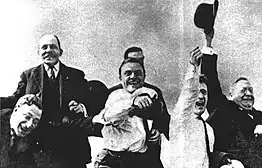Enthusiasm
In modern usage, enthusiasm refers to intense enjoyment, interest, or approval expressed by a person. The term is related to playfulness, inventiveness, optimism, zest, verve, and high energy.[1] The word was originally used to refer to a person possessed by God, or someone who exhibited intense piety.

| Part of a series on |
| Emotions |
|---|
  |
Historical usage
.jpg.webp)
The word enthusiasm originates from the Greek ἐνθουσιασμός from ἐν (en, “in”) and θεός (theós, “god”), meaning "inspired or possessed by [a] god". Applied by the Greeks to manifestations of divine possession, by Apollo (as in the case of the Pythia), or by Dionysus (as in the case of the Bacchantes and Maenads), the term enthusiasm was also used in a transferred or figurative sense. Socrates taught that the inspiration of poets is a form of enthusiasm.[3] The term was confined to a belief in religious inspiration, or to intense religious fervor or emotion.
From this, a Syrian sect of the fourth century was known as the Enthusiasts. They believed that "by perpetual prayer, ascetic practices, and contemplation, man could become inspired by the Holy Spirit, in spite of the ruling evil spirit, which the fall had given to him". From their belief in the efficacy of prayer, they were also known as Euchites.[4]
Several Protestant Christian denominations that emerged in the 16th and 17th centuries, especially those who hold revivals, were called enthusiastic.[4]
Pejorative use
During the years that immediately followed the Glorious Revolution, "enthusiasm" was a British pejorative term for advocacy of any political or religious cause in public, i.e. fanaticism. Such "enthusiasm" was seen in the time around 1700 as the cause of the previous century's English Civil War and its attendant atrocities, and thus it was an absolute social sin to remind others of the war by engaging in enthusiasm. The Royal Society bylaws stipulated that any person discussing religion or politics at a Society meeting was to be summarily ejected for being an "enthusiast."[5]
During the 18th century, popular Methodists such as John Wesley or George Whitefield were accused of blind enthusiasm, a charge against which they defended themselves by distinguishing fanaticism from "religion of the heart." Methodists who enthusiastically preach about and experience the new birth (first work of grace) and entire sanctification (second work of grace) often have emotional experiences.[2][4]
See also
- Artistic inspiration – Unconscious burst of creativity
- Connoisseur – Subject-matter expert
- Emotional contagion – Spontaneous spread of emotions among a group
- Entheogen – Psychoactive substances that induce spiritual experiences
- Euphoria – Intense feelings of well-being
- Fan (person) – Person who is enthusiastically devoted to something or someone
- Flow (psychology) – Full immersion in an activity
- Motivation – Inner state causing goal-directed behavior
- Zest (positive psychology) – Zest for living
References
- Daniels, D.; Price, V. (2000). The Essential Enneagram. New York: HarperCollins. p. 64. ISBN 0-06-251676-0.
- Gibson, James. "Wesleyan Heritage Series: Entire Sanctification". South Georgia Confessing Association. Archived from the original on 29 May 2018. Retrieved 30 May 2018.
- Shelton, Matthew James (2019). Madness in Socratic Philosophy Xenophon, Plato and Epictetus (PDF) (PhD thesis). University of St Andrews. p. 9. Retrieved 16 May 2021.
- Brackney, William H. (2012). Historical dictionary of radical Christianity. Lanham, Md.: Scarecrow Press. p. 117. ISBN 978-0810871793.
- Williamson, George (1933). "The Restoration Revolt against Enthusiasm". Studies in Philology. 30 (4): 571–603. ISSN 0039-3738. JSTOR 4625155.
Further reading
- Grooms, Joshua. Enthusiasm: A Study in Project Management. London: Cambridge University Press.
- Knox, Ronald Arbuthnott (1950). Enthusiasm: a chapter in the history of religion, with special reference to the XVII and XVIII centuries. New York: Oxford University Press. OCLC 1542527.
- Locke, John. An Essay Concerning Human Understanding. Vol. 2.
- Tucker, Susie I. (1972). Enthusiasm: A Study in Semantic Change. Cambridge [Eng.]: Cambridge University Press. ISBN 978-0-521-08263-1.